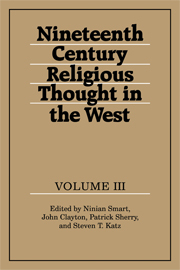Book contents
- Frontmatter
- Contents
- Preface
- 1 RELIGION AND SCIENCE
- 2 FRIEDRICH NIETZSCHE
- 3 JEWISH THOUGHT
- 4 THE STUDY OF THE OLD TESTAMENT
- 5 THE STUDY OF THE NEW TESTAMENT
- 6 FRIEDRICH MAX MÜLLER AND THE COMPARATIVE STUDY OF RELIGION
- 7 THE ANTHROPOLOGY OF RELIGION: BRITISH AND FRENCH SCHOOLS
- 8 MAX WEBER AND GERMAN SOCIOLOGY OF RELIGION
- 9 ERNST TROELTSCH
- INDEX
6 - FRIEDRICH MAX MÜLLER AND THE COMPARATIVE STUDY OF RELIGION
Published online by Cambridge University Press: 26 January 2010
- Frontmatter
- Contents
- Preface
- 1 RELIGION AND SCIENCE
- 2 FRIEDRICH NIETZSCHE
- 3 JEWISH THOUGHT
- 4 THE STUDY OF THE OLD TESTAMENT
- 5 THE STUDY OF THE NEW TESTAMENT
- 6 FRIEDRICH MAX MÜLLER AND THE COMPARATIVE STUDY OF RELIGION
- 7 THE ANTHROPOLOGY OF RELIGION: BRITISH AND FRENCH SCHOOLS
- 8 MAX WEBER AND GERMAN SOCIOLOGY OF RELIGION
- 9 ERNST TROELTSCH
- INDEX
Summary
It has often been stated that Friedrich Max Müller, more than anyone else was responsible for founding the comparative study of religions. There is a considerable degree of truth in this assertion. Although his methodology and theoretical constructs are now quite outmoded and his opinions have been devastatingly and deservedly criticized, Müller's influence on his nineteenth-century contemporaries was great and it remains strong even today.
No survey of the history of the discipline would be complete without reference to him – to his work on the Rg-Veda, to his emphasis on solar mythology, to his theory of the origins of deities in a ‘disease of the language’ or to his description of henotheism as distinct from mono-and polytheism. Moreover, the fifty volumes of the Sacred Books of the East – a series which he founded and edited – rightfully remain the constant companions of orientalists and historians of religions alike and still continue to orient (and to prejudice) our studies in these fields.
In addition to his scholarly work, however, Müller also sought to popularize his area of inquiry. In his public lectures, in his numerous essays, and as a professor in the classroom, he did not hesitate to express himself on the basic aims and theoretical foundations not only of the field of religious studies, but of Indology, philosophy, philology and comparative mythology as well. None of these disciplines would have remained the same without him.
- Type
- Chapter
- Information
- Nineteenth-Century Religious Thought in the West , pp. 179 - 214Publisher: Cambridge University PressPrint publication year: 1985
- 2
- Cited by



